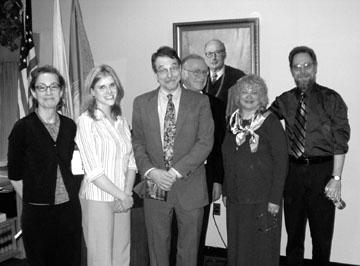Susan C. Schneider was a member of the UMB history department from 1969 until her untimely death in 1987. She was a woman who was as much an activist as a scholar, devoting time not only to the enlightenment of students at home on the hot-button issues of Latin America, but also to promote social change in Brazil, Central America and the Caribbean. Professor Schneider was only the second director of UMB’s Latin American Studies Program, and while in that position she became a great influence to her students, advocating progressive leftist politics and reform in the poverty-stricken nations of Latin America, as well as the rest of the third world.
After Schneider’s death, a fund was established in her memory, maintained with contributions from her family and UMB faculty. Drawn from this fund is the Susan C. Schneider Memorial Prize – a $500 award granted to a graduating UMB student who exhibits the same kind of excellence in both academia and activism that Schneider herself showed. On Tuesday, April 22, the third such award was presented to Jessica Smith, a 23-year-old Long Island native in the university’s American Studies program. The award presentation ceremony took place at the Chancellor’s Conference Room on the 3rd floor of the Quinn Administration Building at 4:15pm, with close to 40 people in attendance, including Professor Schneider’s husband, sister and brother-in-law.
The ceremony began with a greeting from Hispanic Studies Department Chairperson Clara Estow, who then handed the podium over to Paul Fonteyn, provost and vice chancellor for Academic Affairs. Fonteyn gave a 5-minute overview of what the Susan C. Schneider Memorial Prize represents, including a brief retrospective on Schneider’s life. Next to speak was Jack Spence, the associate dean of the College of Liberal Arts. Spence gave a 10-minute prepared speech recounting his experience of the late Prof. Schneider’s memorial service in 1987 at Boston’s Arlington Street Church, citing encomia from Susan’s many friends, including Leonor Hooper, counsel general of the Nicaraguan Embassy in Washington, who had at one point been expelled from the U.S., Uriel Molina, a Franciscan priest of Managua, who had made the acquaintance of Susan and Ralph Schneider while working on a fundraiser for an orphanage in Yali, Nicaragua, and Loretta Slover, a former high-ranking UMB professor and long-time colleague of Schneider. “She touched us with her ability to love and hold a vision of a more just society and a better world,” Spence recalled Hooper speaking of Schneider, adding, “That [Hooper & Molina] participated in this service is to me testimony of Susan’s remarkable ability to touch people.”
Rusty Simonds of the university’s Political Science Department, another long-time friend and colleague of Schneider, was the next to speak. Simonds, who did not have a prepared speech, presented the audience with a very romanticized portrait of the Susan Schneider. “This was an extraordinary woman… She was a walking oxymoron, with a relaxed focus and an intense laziness,” said Simonds, referring to Schneider’s uncanny mix of laid-back charm, incisive wit and wisdom, and daring fashion sense. Simonds continued to speak at great length about Schneider’s profound idealism and honesty, saying, “She hated hypocrisy and detested bullies,” and, “She was relentless in her interrogation of herself.” Simonds spoke for approximately 10 minutes, until 4:40, at which time the floor was given to a musical performance from Ari and Andreza Mendes, which was covered by The Mass Media’s arts staff.
At 4:50 Ann Blum of the Latin American Studies program formally awarded the Susan C. Schneider Prize to Jessica Smith, telling the audience of the recipient’s dedication to not only her studies (building on her interests in international relations, politics, history, economics and culture) but also to her work with urban preschool programs serving migrant families, and the UMB Socialist Alternative group. Upon receiving her award, Ms. Smith, who had attended the University of New Hampshire as a freshman and also spent a semester at Nassau Community College on Long Island before coming to UMass Boston in fall of 2000, gave a brief acceptance speech. Smith expounded the virtues of the UMB faculty having reinforced in her the idea that the past is inextricably bound with the present and that politics is an essential element of daily life. When asked about her future plans, Smith said she will be pursuing a master’s degree in public higher education, and would like to travel to Central America.

